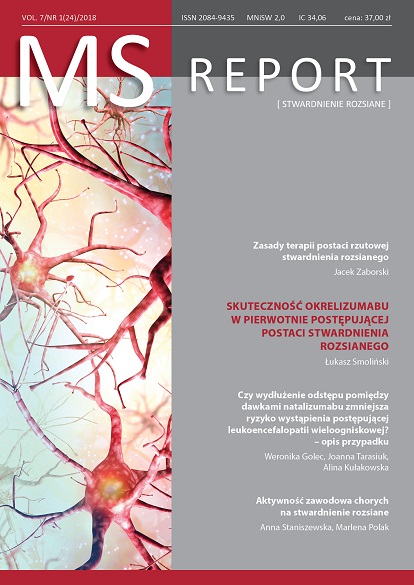Efficacy of ocrelizumab in primary progressive multiple sclerosis Review article
Main Article Content
Abstract
Ocrelizumab is the first disease-modifying drug registered in primary progressive multiple sclerosis. Before the registration of ocrelizumab, these disease-modifying drugs were available only for patients with relapsing-remitting and secondary progressive multiple sclerosis. Ocrelizumab is an anti-CD20 monoclonal antibody that reduces B-cell counts in the blood. Ocrelizumab was registered after the pivotal ORATORIO study showed that it slows down disease progression in patients with primary progressive multiple sclerosis.
European Medicines Agency approved ocrelizumab for use in the treatment of adult patients with relapsing forms of multiple sclerosis and early primary progressive multiple sclerosis, assessed by means of a duration of the disease and level of disability as well as radiological features characteristic of inflammatory activity.
Article Details
Copyright © by Medical Education. All rights reserved.
References
2. Miller D.H., Leary S.M.: Primary-progressive multiple sclerosis. Lancet Neurol. 2007; 6: 903-912.
3. Lublin F., Miller D.H., Freedman M.S. et al.: Oral fingolimod in primary progressive multiple sclerosis (INFORMS): a phase 3, randomised, double-blind, placebo- controlled trial. Lancet 2016; 387: 1075-1084.
4. Thompson A.J., Banwell B.L., Barkhof F. et al.: Diagnosis of multiple sclerosis: 2017 revisions of the McDonald criteria. Lancet Neurol. 2018; 17: 162-173.
5. Frampton J.E.: Ocrelizumab: First Global Approval. Drugs 2017; 77: 1035-1041. DOI: 10.1007/s40265-017-0757-6.
6. Montalban X., Hauser S.L., Kappos L. et al.: Ocrelizumab versus placebo in primary progressive multiple sclerosis. N. Engl. J. Med. 2017; 376: 209-220.
7. Ontaneda D., Fox R.J., Chataway J.: Clinical trials in progressive multiple sclerosis: lessons learned and future perspectives. Lancet Neurol. 2015; 14: 208-223.
8. Stahnke A.M., Holt K.M.: Ocrelizumab: A New B-cell Therapy for Relapsing Remitting and Primary Progressive Multiple Sclerosis. Ann. Pharmacother. 2017: 106002801774763.
9. Gelfand J.M., Cree B.A.C., Hauser S.L.: Ocrelizumab and Other CD20+ B-Cell-Depleting Therapies in Multiple Sclerosis. Neurotherapeutics 2017; 14: 835-841.
10. Sabatino J.J., Zamvil S.S., Hauser S.L.: B-Cell Therapies in Multiple Sclerosis. Cold Spring Harb. Perspect. Med. 2018: a032037.
11. Baker D., Marta M., Pryce G. et al.: Memory B Cells are Major Targets for Effective Immunotherapy in Relapsing Multiple Sclerosis. EBioMedicine 2017; 16: 41-50.
12. Wekerle H.: B cells in multiple sclerosis. Autoimmunity 2017; 50: 57-60.
13. Mahad D.H., Trapp B.D., Lassmann H.: Pathological mechanisms in progressive multiple sclerosis. Lancet Neurol. 2015; 14: 183-193.
14. Luchetti S., Fransen N.L., van Eden C.G. et al.: Progressive multiple sclerosis patients show substantial lesion activity that correlates with clinical disease severity and sex: a retrospective autopsy cohort analysis. Acta Neuropathol. 2018; 135: 511-528.
15. Hawker K., O’Connor P., Freedman M.S et al.: Rituximab in patients with primary progressive multiple sclerosis: results of a randomized double-blind placebo- controlled multicenter trial. Ann. Neurol. 2009; 66: 460-471.

